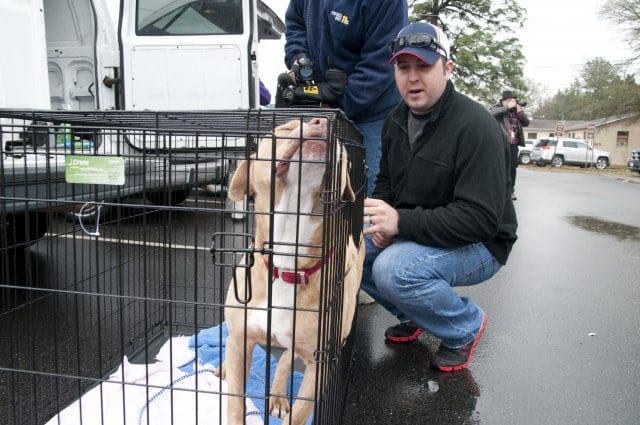
Adopted dogs to help soldiers deal with PTSD
Tommy is a dog Walis got from Afghanistan at the end of his tour there in 2009. Walis says it’s hard to describe how much Tommy has helped him; when he is depressed and needs a supportive companion, the dog is there, offering unconditional love. When Walis would rather stay in his New York home, away from the rest of the world, Tommy begs to go to a park or for a walk in the woods.
“Once I got him, I was surprised by how much better I felt,” he said.
Walis believes other soldiers could benefit from having a pet, too. That’s why he traveled to Fort Bragg last month with the all-volunteer New York-based Guardians of Rescue to collect nine dogs from the Animal Control and Adoption Center on post. The group specifically wanted animals from a military base to take back North where the group will use its “Soldier to Soldier” program to pair up as many dogs as possible with veterans there who have PTSD or other psychological issues.
Guardians of Rescue brought Tommy to Walis. He’s one of 10 dogs the group has brought back from Afghanistan to reunite with U.S. troops who cared for them during their deployments. The dogs were local strays taken in by service members.
The trip to Fort Bragg was the group’s first foray to an animal shelter on a military base, and Walis, who now volunteers with the group, said he hopes it can make similar arrangements with shelters on other posts around the country. It would like to do similar work with shelter cats.
About 1,500 to 2,000 dogs and cats come through the Fort Bragg Adoption Center each year, said Jeff Hust, assistant manager of the facility. A handful are pets that soldiers have to leave behind when they deploy. Most are strays whose owners don’t claim them, or animals that get dumped on the sprawling post that covers 251 square miles in four counties, Hust said.
The shelter is a small block facility that can house 18 dogs and 25 cats at a time.
Hust and Robert Misseri, president of the group, took a pit bull named Tank out of his cage to scratch his back and rub his head. Eventually, the dogs were loaded into crates and vehicles for a trip across town.
The dogs first would be taken to the Fayetteville Animal Protection Society for medical checkups, and spay and neuter procedures where necessary. Another volunteer group, Pilots N Paws, later will take the dogs to New York in small planes.
Some may need some training as therapy dogs before they can be placed with soldiers, Misseri others. Others are ready to take up with new owners right away.
As much as the animals need new homes, “Soldiers need these dogs,” Misseri said. Starting every day getting licked in the face by a grateful pooch is better than nearly any pharmaceutical, he said.
“No therapy can ever replicate that.”
___
Information from: The News & Observer, http://www.newsobserver.com






